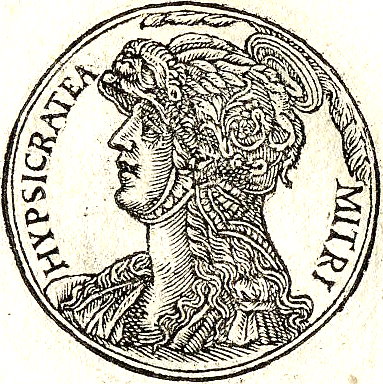|
Hypsicratea
Hypsicratea or Hypsikrateia (flourished 63 BC), was the concubine, and perhaps wife, of King Mithridates VI of Pontus. Life Nothing is known of the family background of Hypsicratea, although it has been noted that her name suggests that her family came from the Cimmerian Bosporus. All the information about her relates to the final years of Mithridates' reign. Hypsicratea accompanied Mithridates during his escape around the east coast of the Black Sea, following his final defeat by Pompey in 66 B.C. She probably died during an uprising in Phanagoria in 63 B.C. After Mithridates' defeat, Hypsicratea broke free of Pompey's blockade and while the rest dispersed she was one of only three who remained by the King's side. Plutarch wrote that she was: :''"...always manly (androdes) and extremely bold, the king consequently liked to call her Hypsicrates. At that time taking possession of a cloak and horse of a Persian man she neither flagged in body before the distances they ran nor d ... [...More Info...] [...Related Items...] OR: [Wikipedia] [Google] [Baidu] |
Hypsicratea
Hypsicratea or Hypsikrateia (flourished 63 BC), was the concubine, and perhaps wife, of King Mithridates VI of Pontus. Life Nothing is known of the family background of Hypsicratea, although it has been noted that her name suggests that her family came from the Cimmerian Bosporus. All the information about her relates to the final years of Mithridates' reign. Hypsicratea accompanied Mithridates during his escape around the east coast of the Black Sea, following his final defeat by Pompey in 66 B.C. She probably died during an uprising in Phanagoria in 63 B.C. After Mithridates' defeat, Hypsicratea broke free of Pompey's blockade and while the rest dispersed she was one of only three who remained by the King's side. Plutarch wrote that she was: :''"...always manly (androdes) and extremely bold, the king consequently liked to call her Hypsicrates. At that time taking possession of a cloak and horse of a Persian man she neither flagged in body before the distances they ran nor d ... [...More Info...] [...Related Items...] OR: [Wikipedia] [Google] [Baidu] |
